
Morning Brief – Tuesday 27th
Wobbly Trump:
The White House has changed direction once again, lashing out at China and Brexit in one foul swoop. Attacking Brexit, Trump said that the deal is not a good deal for the United Kingdom; instead, it favours the European Union, prejudicing British trade and independence. Drawing from dubious foundations, Trump also noted that the deal could prevent the UK from trading with the United States and other critical trading partners during the transition period. Speaking ahead of the G20 Summit taking place on Friday and Saturday of this week, Trump drew into question scenarios that had been assumed as given for several weeks. For a long time now, markets have priced in the possibility of trade resolution between the conflicting trading leviathans of China and the United States. However, news has come to market that should Trump and Chinese President Xi Jinping not agree upon a trade resolution this weekend, further tariffs upon billions of dollars’ worth of Chinese exports could be levied. Moreover, the tune of tariffs is up for negotiation, with sanctions anywhere from 10% to 25% being discussed. The two increasingly protectionist states must agree to trade more freely upon a level playing field, affording mutual access to each others’ markets. Following increasing defensive demand, the US Dollar has appreciated moderately, clawing back the 1.13 resistance level against the Euro. Should the two states agree to suspend the inhibitions to trade (that have been generated through the levying of tariffs) global growth forecast would be revised upwards. The increase in risk appetite could prevent the Dollar from appreciating further, however, the opportunities for domestic economy growth will offset this effect. Despite the crisis unfolding in Italy day by day, Mario Draghi, President of the European Central Bank, has reaffirmed his commitment to normalise monetary policy by the end of this year. The asset purchase program that the ECB has embarked upon since promising to do “whatever it takes” to save the Eurozone now stands at a colossal $2.6 trillion. Removing the ultra-accommodative monetary policy is imperative for the Euro to recover value and stick to the timetable of hiking interest rates following the summer of 2019.

Discussion and Analysis by Charles Porter

Related Insights

Daily Brief – A short lived short squeeze?
A short lived short squeeze? Sterling is undoubtedly benefitting from a short squeeze. Traders on net had increased positions that benefit from Sterling’s demise leading into the budget. Depending upon the participant’s persuasion, that could have meant gaining an outright short exposure to the currency or, in a more mild form, trimming any or all […]

Daily Brief – Big day of a big week
Big day of a big week Markets have an action-packed week ahead of them. Three G10 central bank decisions will be published, kicking off with the ECB tomorrow. Thursday is the turn of the Bank of England and on Friday, the BoJ. But it’s not just the smattering of pre-Christmas central bank meetings that should […]

Daily Brief – A week out
A week out Markets are now in their final few trading days ahead of a Fed blackout that will precede the Reserve’s decision next Wednesday. The US government shutdown, despite now feeling like a distant memory, continues to weigh on the Dollar and market pricing in general. In particular, as we approach the decision next […]



 Charles Porter
Charles Porter